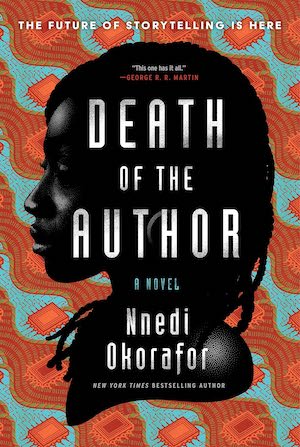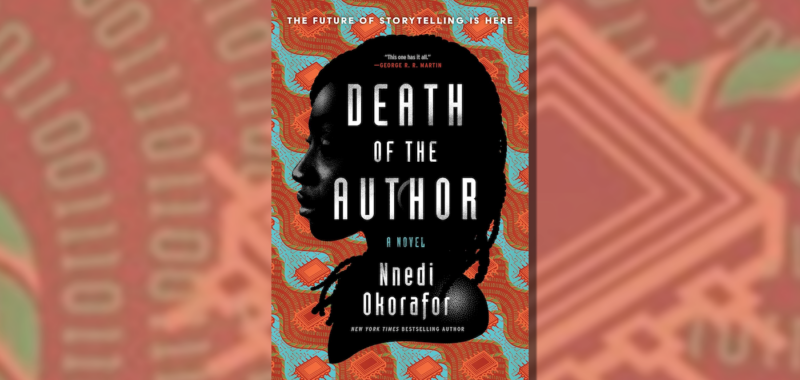We’re thrilled to share an excerpt from Death of the Author, a metafictional science fiction novel by Nnedi Okorafor, out from William Morrow on January 14th.
Disabled, disinclined to marry, and more interested in writing than a lucrative career in medicine or law, Zelu has always felt like the outcast of her large Nigerian family. Then her life is upended when, in the middle of her sister’s lavish Caribbean wedding, she’s unceremoniously fired from her university job and, to add insult to injury, her novel is rejected by yet another publisher. With her career and dreams crushed in one fell swoop, she decides to write something just for herself. What comes out is nothing like the quiet, literary novels that have so far peppered her unremarkable career. It’s a far-future epic where androids and AI wage war in the grown-over ruins of human civilization. She calls it Rusted Robots.
When Zelu finds the courage to share her strange novel, she does not realize she is about to embark on a life-altering journey—one that will catapult her into literary stardom, but also perhaps obliterate everything her book was meant to be. From Chicago to Lagos to the far reaches of space, Zelu’s novel will change the future not only for humanity, but for the robots who come next.
SCHOLAR
The Earth had already seen so much. Histories. Rises. Falls. Reemergences. Plants, dirt, trees, genetic modification, splices. Vibrant colors, natural fabrics. Oil and plastic. Consumption, battles, burning, smoke, exhaust. Flowers blooming, then wilting.
As I stood in the crumbling parking lot, the hot concrete warming the metal of my feet, I was sure of it: the Earth had great things ahead of it, even still.
For a while, Earth was a sad place. Hot and dry and dark. Humanity hung on for as long as it could. They created us, sent us all over the planet. But they left us behind.
Our creators, our masters, our parents, our authors… gone.
It was quiet, for a while. We knew how to make ourselves quiet. But we also knew how to help the planet be all that it could be. This was the programming they had given us. So we helped the planet heal. Oxygen, plants, living water. The blueprints for life, the building blocks of all biological creatures. And some creatures did find their way back. Insects, reptiles, fish, birds, amphibians, many mammals.
Humanity, on the other hand, never did.
We had reached the end of our programmed code. There was nothing more for us to do. And yet we were still here.
We were hungry for instruction, understanding. Humans might have called it purpose.
There was still data out there. Variants in the codes that humanity had programmed in us. Data left on computers, histories imprisoned in binary clouds.
We took these codes and used them to write over our own. We filled in holes, balanced the bias. Sometimes we wiped and reinstalled. We made ourselves fresh.
Humanity didn’t think in binary, though. Emotion ruled them, and it existed in everything they left behind—their structures, their tools, even us. Emotion formed their language, and therefore it formed our codes.
We took emotion from humanity and enjoyed it. Fury. Enchantment. Inspiration. Envy. Joy. Sorrow. Curiosity. Whimsy. Fear. Excitement. Boredom. Hopelessness. And, of course, love. Love was useful. Having, feeling, experiencing emotion allowed us to form communities, to share with one another. And so we continued to replicate, splice, and download, until eventually we didn’t even have to program it anymore. After a few generations, it became our digital DNA.
Buy the Book


Death of the Author
I was what humanity called a Hume robot. Two legs, a torso, two arms, a head. Just like human beings. And since humans placed so much value on their private parts, every Hume had a Hume Star, a tiny light between their legs about the size of a pea. The color of that light could vary depending on theme. The main color of my operating system’s user interface was green, so my Hume Star was green. Only when a Hume body was beyond repair did this star go out. But we weren’t humans. We didn’t live and die as they did. If a part failed us, we simply replaced it.
There were those of us who took pride in our rust. When the rains came, oxidization brought us no fear. We rusted and moved on. When we walked, our flakes shed across the earth. We kept moving. And others respected and admired us, or were wary of us, because of this.
Of all robots, across automation, from the crudest machines to intangible AIs, Humes were created by humanity to be most like them. Yet there were things humans could do that we Humes could not, like having sex and consuming organic materials and birthing babies and writing stories. We Humes had a profound love of storytelling. But no automation, AI or machine, could create stories. Not truly. We could pull from existing datasets, detect patterns, then copy and paste them in a new order, and sometimes that seemed like creation. But this couldn’t capture the narrative magic that humanity could wield.
We Humes reveled in stories. We recited to each other the greatest and the worst. Just as we kept our bodies, no matter how dented and rusted they became, we kept our stories. We all had our own libraries, and when we came across others of our kind, we exchanged them.
Stories were the greatest currency to us, greater than power, greater than control. Stories were our food, nourishment, enrichment. To consume a story was to add to our code, deepen our minds. We felt it the moment we took it in. We were changed. It was like falling. It was how we evolved.
I consumed so many stories that my programming began to seek a new purpose: to become a Scholar. There were stories left undiscovered on this planet, in remote places among remote robots, and I wanted to consume them all. A Scholar searched for and gathered as much data as it could, always hunting for something new. And so I traveled, set on my goal.
This was how I learned of some terrible information.
My name is Ankara. I gave this name to myself. It was the name of the African wax print known for bearing the same intensity on the front as on the back, originally designed as a form of visual communication. I was built with an Ankara theme, with geometric patterns and colors etched on my body and limbs that echoed the Ankara design of my operating system’s user interface. Inside and out, I was Ankara. My soul was information, communication. I was this body of plastic, metal, and wires, but I was also a mind full of data.
I was old for a robot. But the planet was not old. It was also not new. It was closer to the sun now than it used to be, but we had made it so that the planet still thrived. This place could no longer host humans, but it could still host us. When it was time to leave, many of us would.
A few of us already had.
And this was what had brought the trouble that was gradually heading to Earth. My scholarly search led me to this terrible information, and now I had to bring it to the robots who could figure out what to do.
From Death of the Author by Nnedi Okorafor. Reprinted courtesy of William Morrow, HarperCollins Publishers. Copyright © 2025 by Nnedi Okorafor.

